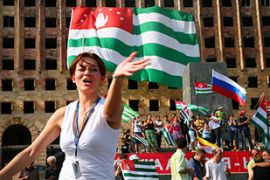West condemns Moscow over Georgia
Russia “outside international law” and in breach of security accords, France says.

The Georgian president accuses Russia of trying to “wipe Georgia from the map”.
Speaking on Tuesday, Mikheil Saakashvili said: “This is the first attempt in Europe after Nazi Germany and the Stalinist Soviet Union to put a neighbouring state on its knees and to change the borders of Europe by force.”
Neave Barker, reporting for Al Jazeera from Moscow, said: “There is very little that Saakashvili’s government can do at the moment apart from attempting to solidify support inside his own country.
“What he’s doing right now is attempting to galvanise a sense of statehood, a sense of national unity and he’s using the greater international community – Europe, the United States, international institutions like Nato and the EU to try and give his leadership a degree of weight.”
‘Restore balance’
Russia says that the steps it took were meant to restore balance in the region and prevent a genocide.
Dmitri Medvedev, Russia’s president, told Al Jazeera: “This is about standard, although rare, international procedure – the procedure of recognising an independent state.
| Georgia’s separatists |
|
South Ossetia is a territory of about 70,000 inhabitants, the majority of whom are Orthodox Christians, located in the Caucasus mountains. Referendums held in 1992 and again in 2006 demanded independence, but were notrecognised internationally. Abkhazia has about 250,000 inhabitants, most of whom have a Russian passport. The region makes up about 12 per cent of Georgian territory and the majority of Abkhazians are Muslim. Abkhazia unilaterally proclaimed its independence in July 1992 and separatists pushed Georgian troops from the Kodori Gorge on August 12, 2008 – the only part of the region Georgia had controlled. |
We took this step … in order to prevent genocide, in order for Abkhazia and South Ossetia to declare independence.
After the 17 years, and failures, of restoring balance, we did not take any steps before to recognized these states but instead we tried to mend the government of Georgia. But Saakashvili’s genocide has stopped this, and we had to do this.”
Moscow formally recognised the breakaway regions, which have both received long-term support from Moscow, as independent following the recent conflict between Russia and Georgia, which began when Tblisi attempted to re-establish its authority over South Ossetia.
Western condemnation
Despite Medvedev’s justification, leaders in the West have reacted strongly against Russia’s announcement.
Condoleeza Rice, the US secretary of state, said Russia’s move was “regrettable” and vowed the US would not let any attempt to recognise the regions’ independence through the UN Security Council.
Germany, which has strong economic ties with Russia and is traditionally less critical of Russia in groups such as the EU and Nato, also reacted sharply.
“This contradicts principles of territorial integrity as a fundamental right,” Angela Merkel, the German chancellor, said on a visit to Estonia, a former Soviet republic.
Nato also rejected Russia’s decision.
The alliance confirmed this year that it would press ahead with Georgian membership, a move that has angered Moscow.
EU leaders including Merkel are to hold an emergency meeting in Brussels next week to discuss their response to Russia, which still has troops in Georgian territory.
Nato ‘build-up’
Also on Wednesday, a top Russian general said that Russia’s navy is monitoring Nato ships in the Black Sea, warning that a further build-up could be in violation of a pre-World War II agreement.
“In light of the build-up of Nato naval forces in the Black Sea, the fleet has also taken on the task of monitoring their activities,” Anatoly Nogovitsyn, the deputy head of Russia’s general staff, said in a briefing.
Nato must respect limits set on vessels deployed in the Black Sea that were set in the 1936 agreement signed in Montreux, Switzerland, he said.
The Montreux Convention, as it is called, sets a weight restriction of 45,000 tonnes on the number of warships that countries outside the Black Sea region can deploy in the basin.
“Can Nato … indefinitely build up its forces and means there? It turns out it cannot,” Nogovitsyn said.
Tension has risen in the Black Sea after Russia sent ships to the coast near Georgia as part of its response to Tbilisi’s offensive to retake South Ossetia.
The United States separately has sent the US navy destroyer USS McFaul and another ship to Georgia to deliver humanitarian aid, a move that has been sharply criticised by Moscow.
“Normally battleships do not deliver aid and this is battleship diplomacy, this does not make the situation more stable,” Sergei Lavrov, the foreign minister, said in Moscow on Tuesday.
The US Coast Guard Cutter Dallas docked in Georgia’s southern port city of Batumi on Wednesday while the Russian missile cruiser Moskva (Moscow) arrived along with other ships in Sukhumi, the capital of breakaway Abkhazia.
